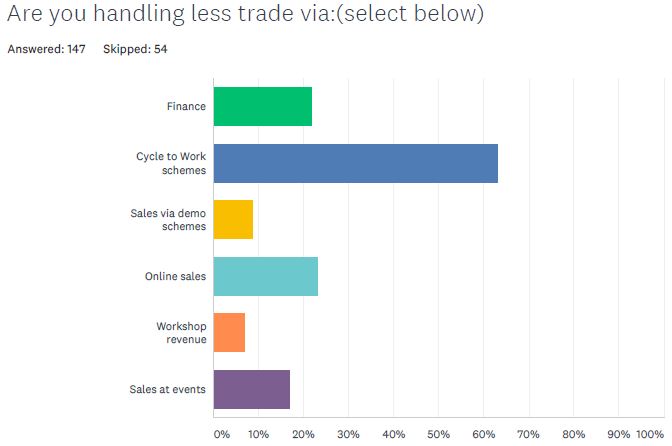Complexity slows UK bike biz bid to sell above former cycle to work cap
Cycle to Work providers are struggling to sell bikes costing more than £1,000 under the salary sacrifice scheme since new government guidance was issued almost three months ago, because of how complex such a scheme is to implement.
Although the industry welcomed the updated guidance, released in June, confirming £1,000-plus bikes could be sold under Cycle to Work, those already administering the sub-£1000 salary sacrifice scheme as part of the Cycle to Work Alliance say ‘unclear wording’ in the new documentation makes ‘a compliant, limit-free scheme… very difficult to execute’.
Meanwhile, the Green Commute Initiative (GCI), which has run a £1000+ scheme since 2016, says employers are joining at a rate of two or three a day to take advantage of what was widely advertised as a ‘cap lift’ – and it isn’t about to reveal any secrets. While Halfords claims it has managed to implement the scheme, GCI asks why it hasn’t shared the information with fellow Cycle to Work Alliance (C2WA) members if so.
In a post on its website Cycle Solutions, a Cycle to Work provider, said: “Since this updated scheme guidance was published, it has come to light that the new documentation contained some unclear wording which meant that while in theory the limit had been removed, the actual process of creating a compliant, limit-free scheme was very difficult to execute.”
The chair of the Cycle to Work Alliance, Adrian Warren, confirmed the group is experiencing teething problems, and says it is working closely with the Financial Conduct Authority (FCA) and the Department for Transport (DfT).
“As it stands, not every employer is currently able to offer the expanded scheme due to technical challenges with the new policy”, says Warren. “This is unfortunate, but we must remember that it is early days. Teething problems with changes in complex policy are often to be expected.”
The problem centres around the hire agreement for bikes costing more than £1,000. This is what is known as a regulated credit agreement and if an employer introduces their employees to the C2W provider who is doing the hiring for more than £1,000 this could be construed as credit broking, requiring the employer to be authorised by the Financial Conduct Authority.
While Halfords says it “has been facilitating cycle to work schemes with limits of more than £1000 for a number of years”, Cycling Industry News understands Cycle Solutions has not yet managed to overcome this issue – and one source claimed not a single bike over £1,000 had yet been sold from that group.
Evans Cycles has been in touch to say that it has cracked the legislation.
Rob Howes, of Green Commute Initiative, which is authorised by the FCA and able to operate the £1000-plus scheme, questioned this claim. According to a post last month on Cycle2Work’s website, of which Halfords is the parent company, rollout won’t start until September. Howes suggests Halfords may be administering the scheme via employers’ FCA accreditation, rather than their own.
“You might ask, as Halfords is a member of the C2WA, then why haven’t they shared how they do it with their fellow members?” asked Howes.
Working with the DfT and FCA, GCI set up the business and agreements with a ‘limitless’ Cycle to Work scheme in mind, so employers don’t need credit brokering permission.
“It’s a bit like an Agatha Christie novel, it’s all there, you just have to work it out”, said Howes, who isn’t about to reveal any secrets.
While that’s bad news for the Cycle to Work Alliance, GCI argues it’s good news for bike shops, and employees.
Howes claims some C2W providers charge bike shops 12% on the price of each bike, and as much as 17.5%, charging many employees 7% at the end of the agreement to own the bike. GCI charges bike shops 5% and employees can buy the bike for £1 after five years, when the agreement ends.
“Resellers are migrating to us,” said Howes. “We are getting two or three a day at the moment. We now have 1,300 resellers; it won’t be too long we have got the same as the big guys. Yesterday four major household names turned up, and that’s because we have a solution.”
Howes argues, “We’re better for bike shops, and better for employees.”
A Halfords spokesperson said: “Halfords Cycle2Work has been facilitating cycle to work schemes with limits of more than £1,000 for a number of years under the terms of its FCA authorisation. However, this has significantly increased since the new guidance has been released.
“We have, of course, carefully scrutinised the new guidance to ensure we continue to offer fully compliant schemes no matter the limit for companies and their employees.”
Halfords would not reveal the rates it charges customers, saying it is “commercially sensitive”.
Cycle Solutions, also a member of the Cycle to Work Alliance, is still trying to crack the mystery. The company statement reads: “We must ensure that the schemes we provide are fully compliant with the latest legislation and we (along with all other providers) would be unable to guarantee that at this point.”
As highlighted last year by CI.N’s annual Independent Retail Channel Study, 63% of retailers report doing less Cycle to Work trade year-on-year.
 The Department for Transport (DfT) says it regularly engages with industry so employers understand how to implement the scheme.
The Department for Transport (DfT) says it regularly engages with industry so employers understand how to implement the scheme.
“Cycling is a vital and easy way to improve air quality, reduce pollution and create vibrant towns and cities,” it said in a statement.
“We want everyone to feel empowered to make cycling a part of their everyday lives, and our Cycle to Work scheme provides many incentives to help people do this.”
The FCA pointed CI.N to the DfT’s guidance paper on Cycle to Work.
Sports Direct, Evans Cycles’ parent company, didn’t respond to request for comment. Cycle Solutions directed CI.N to the Cycle to Work Alliance’s PR company, WA Comms.
CyclingIndustry.News is soon to run our annual Independent Retail Channel Study, which will once more dig for more retail data on Cycle to Work performance. To find our how your business can benefit as a sponsor of our work, contact the editor here.



